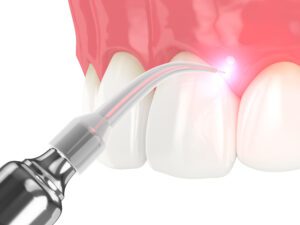Dental technology continues to update and evolve with time. One of the best advancements is dental lasers. Lasers make treatment quicker, easier, and less painful. They can also be used for a variety of different treatment options. We’re proud to offer laser dentistry as a general dental treatment in our Denton, TX office.
Laser Dentistry in Denton, TX
We can apply laser dentistry for a variety of dental procedures. It’s a valuable tool in our arsenal and allows us to be versatile with our treatment capabilities.

Treating Gum Disease
One of the most common uses of dental lasers is for gum disease treatment. With gum disease, pockets form between your gum tissue and the jawbone, filling with bacteria and food debris. A laser lets us clean out these pockets with a precise laser tip. We delicately slip the laser under the gum line, using its heat energy to clean and sterilize the area.
With more severe cases of gum disease, we can treat the tissue with a laser instead of performing more invasive surgical procedures. With advanced periodontal disease, you haven’t removed the bacteria from under the gumline. White blood cells attack these bacteria, starting to erode the jawbone. Eventually, they’ll attack the structures that connect the tooth to the bone, causing loose teeth that can start to fall out.
We use a high heat laser to both clean out the bacteria and break down and remove diseased tissue. The laser’s heat also stimulates the body’s natural healing process, generating bone growth in the affected area. To be a successful treatment, you’ll also have to keep up with diligent oral health care to ensure the infection doesn’t return to these heights.
Removing Excessive Gum Tissue
Excessive gum tissue can have cosmetic and restorative implications. Cosmetically, it’s used to treat a gummy smile. Having an overgrowth of gum tissue makes your teeth look smaller and throws off the balance of your smile. We perform crown lengthening, removing this excess gum tissue so that more of your tooth is visible. We may also add a crown or veneer to supplement the tooth.
An overgrowth of gums can affect your smile in various ways. Certain medications may cause the gum growth rate to increase. Excess gum tissue may cover the wisdom teeth, so we’ll remove it before extraction surgery. If you have braces for a long time, the gums can start growing over the brackets. Excess tissue removal eliminates this tissue, making the brackets more accessible for treatment.
Taking Care of Soft Tissue Issues
Many small soft tissue problems can occur on your gums or the inside of your cheek. We can apply the laser to a cold sore or ulcer, speeding up healing. If you have a boil or abscess on the accessible soft tissue in your mouth, we can use a laser to safely drain it and stimulate the healing process afterward.
Reducing the Frenulum
The lingual frenulum especially can cause issues with the function of your mouth. It connects the tongue to the soft tissue at the base of the jaw. If this is too long or rigid, it can cause you to become tongue-tied, making it difficult to speak or use your tongue properly for various applications. A laser lessens this tissue, allowing you to speak more freely and eliminating speech impediments.
The Benefits of Laser Dentistry Treatment
Patients benefit greatly from laser dental treatment. First, it’s ideal for patients with dental fear or anxiety. A common trigger for this fear is the sound or vibration of machines like the drill. Aside from occasional whooshing air sounds, Lasers are virtually silent and don’t create any vibration. It’s easier to remain calm and relaxed throughout laser dentistry treatment than surgical solutions.
Lasers are much less invasive than other treatment methods, like surgery with a scalpel. A laser uses a concentrated beam of light to perform treatment. Because it’s heat energy, it cauterizes the area as it’s treating it, so there’s much less bleeding and downtime after the procedure. We don’t even have to use sutures to close the wound.
They’re also a more precise method of treatment. Using scalpels, we often have to encounter healthy tissue as well. The laser is extremely precise and doesn’t harm the surrounding areas. This is especially pertinent for delicate procedures like gum tissue removal. When we use the laser, we can home in and only target certain specific areas. We can preserve more of the healthy tissue, eliminating further problems from tissue removal in the future.
The heat sterilizes the area as we treat it, so you have a much smaller risk of infection from lasers. In addition, it’s much less painful than other treatments, too. Many times, we don’t even need to use a local anesthetic.
Frequently Asked Questions
How painful is a laser frenectomy?
A laser frenectomy is generally less painful than the traditional method. The laser seals nerve endings and blood vessels as it works, reducing discomfort during and after the procedure. Most patients experience minimal pain and recover quickly.
How long does it take to heal from a laser frenectomy?
Healing from a laser frenectomy is typically fast. Most people heal within a week to ten days. The laser minimizes swelling and promotes quicker recovery compared to conventional surgery.
Is laser dentistry suitable for children?
Yes, laser dentistry is suitable for children. It can make dental procedures less intimidating because it often doesn’t require drills or needles. Lasers can be used to treat cavities and other issues with less discomfort.
Will I need anesthesia for laser dental procedures?
Many laser dental procedures require little to no anesthesia. The laser can reduce pain and discomfort, sometimes making anesthesia unnecessary. However, it depends on the specific treatment and your comfort level.
Can lasers detect cavities?
Laser cavity detection helps us find decay earlier than traditional methods. The laser scans your teeth and measures how light bounces back, revealing even tiny cavities we can’t see with the naked eye. Early detection means more straightforward, less expensive treatment. It’s completely painless and takes just a few minutes during your exam.
Does insurance cover laser gum surgery?
Insurance coverage for laser gum surgery varies. The coverage typically ranges from 50-80% if it’s deemed medically necessary. It’s important to check with your insurance provider to understand your specific coverage. We can also help you check your specific benefits and explain your out-of-pocket costs before treatment.
Experience Laser Dentistry Treatment
Experience treatment that’s more comfortable, quicker, and less invasive. Call us to schedule an appointment.
